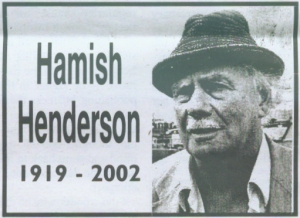|
 Every
mention of Hamish Henderson since his death on the 8th of March has been
prefaced or followed by an anecdote. There is no doubt that he was, if
not larger than life, then at least radically different from most of the
people one has ever met. He wore his convictions, his passions and his
appetites on the outside of his large, gangling frame and that meant
that from him one got the direct experience of great vision and great
humanity. Every
mention of Hamish Henderson since his death on the 8th of March has been
prefaced or followed by an anecdote. There is no doubt that he was, if
not larger than life, then at least radically different from most of the
people one has ever met. He wore his convictions, his passions and his
appetites on the outside of his large, gangling frame and that meant
that from him one got the direct experience of great vision and great
humanity.
In 1990 he was invited to
speak at the Celtic Film and Television Festival at Douarnanez in
Brittany. The Festival that year was secured on the promise of a new
hotel which would be open just in time to take the two hundred or so
delegates from Scotland, Ireland and Wales but— as is the way with such
promises — the hotel failed to materialise and we all found
ourselves in a ramshackle, elderly building on the sea front at Treboul.
Its last full booking had presumably been during the Second World War,
when it housed German officers and its unsuitability for guests in March
was demonstrated by the fact that most of the rooms were built on a
beach, the damp from which pervaded every inch of the threadbare
furnishings.
The rooms and the hotel proper
were linked a boardwalk, and it was on that boardwalk late one night
that I found Hamish, slumped against a sand-dune. I brushed him down and
took him back to the bar for another drink, only to be turned on when I
mildly suggested that "The Freedom Come All Ye" was the only song that
was worthy to be a national anthem for an independent Scotland. Hamish
hated the idea of any national songs and said so in firm tones, and at
great length.
Hamish’s presence at the Festival
was a longer-term commitment
than any of us envisaged. Engaged for one lecture on a Tuesday he was
scheduled to fly in on the Monday and out on the Thursday, the direct
plane to Rennes only operating twice a week.
When I left on the Friday
he was still there, and indeed was apparently still there the following
Friday having missed the weather window three times. No doubt they are
still talking about him in the surrounding Breton fishing villages.
They are talking about
him elsewhere too. He touched so many lives that it is hard to find
anyone in Scotland above forty, who cannot regale you with his or her
one personal experience of Hamish, drunk or sober.
He was a fixture around
Edinburgh when I was a student of Scottish History and Scottish
Literature in the early 1970s and. he had a reputation not just for
extraordinary scholarship, but particularly for his strong and constant
advocacy of those who could not
speak for themselves, or who could not be heard in the clamour of the
capitalist twentieth century. But because he was
first and foremost a poet he did not just
agitate and campaign — he thought and felt, and one always got the sense
that the rawness of his feelings for suffering man and woman kind were
what drove him on.
There are still elitist enclaves
where the study of folk song and folk tradition are regarded as minor
disciplines. Hamish was the greatest of a generation who proved them
wrong and whose interest in travelling people, working people and people
from the linguistic and cultural minorities of Scotland led to a huge
body of recorded work and a huge development in understanding of our
mongrel nation and its cultures. Scotland is literally a different place
as a result of his endeavours.
But
like all cultural nationalists — in the best
sense of the words — he was also an internationalist. Indeed the two
stances are indivisible, for they both arise from a curiosity about, and
identification with, the question of our humanity and our relationships
one with another. It was, after all, Hamish who wrote those haunting
words of unity and compassion at the very start of his "Eleges for the
Dead in Cyrenaica" —"There are many dead in the brutish desert"
and who followed them later with the equally haunting "There were no
gods and precious few heroes/What they regretted when they died had
nothing to do with race and leader".
With all his other achievements and his more
accessible writings — particularly "The Freedom" and "The John MacLean
March" — it has sometimes been
possible to forget those early
poems and their great impact. Writing about
the poems of this former soldier, reflecting upon his experience and its
place in a suffering world, the Times Literary Supplement in January
1949 noted that
"Mr Henderson ‘s compassion
....
gives his poetry a rough humanity, a
sincerity and emotional truth that make it valuable".
Compassion, rough
humanity, sincerity and emotional truth were words that defined Hamish's
whole life. Scotland still has need of them.
Michael Russell MSP |
